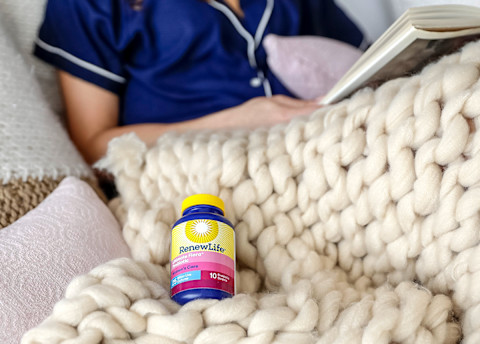Is This Normal, Though? 3 Digestive Problems Women Have, Explained

Whoever said that burping and conversations about going to the bathroom are unladylike must not have been a woman.
The reality is that women typically experience gut issues more than men do. For the record, studies have found that ladies are more likely than men to have acid reflux and heartburn1, deal with irritable bowel syndrome, and get constipated2—so the fact that we'll often keep these issues to ourselves rather than discuss them openly needs to change. Digestive health isn't a taboo topic, and the more we talk about what's going on with our bodies, the more we'll realize that we're far from alone.
Below, we break down three common gut complaints that everyone occasionally experiences from time to time, and—truth bomb—that's normal:
1. Acid Reflux
What's going on: Acid reflux happens when the acid from your stomach moves backward into your esophagus. You can blame the lower esophageal sphincter that connects to your stomach for not tightening properly (its job is to close after food passes through), but it's a pretty common thing that happens, like after eating a spicy or supersized meal, for example.
What it feels like: A sour or bitter taste in your mouth or throat, indigestion, or heartburn—a hot feeling rising up into your chest—are usual symptoms.

What you can do: Experiencing acid reflux is normal once in a while (and more often if you're pregnant), so you've got many options here. For quick heartburn relief, over-the-counter medication can help, and you can also minimize your reflux risk naturally by avoiding acidic foods, practicing more mindful eating (aka not overeating or devouring your meals too quickly), and not eating within three hours of bedtime to give the stomach enough time to completely digest your meal before lying down, according to the NIH.
On the other hand, having weekly symptoms or feeling the burn on the regular could be a sign of gastroesophageal reflux disease (GERD), the chronic, more severe form of acid reflux. GERD is one of the most common digestive disorders—affecting nearly 30% of the U.S. population3 according to a 2014 systemic review—so talk with your doctor about the best way to manage it.
2. Constipation
What's going on: When you're constipated, your normal bowel movement patterns have stalled thanks to reasons that include slower movement of waste through your colon or an underlying condition like IBS. Constipation itself isn't a disease—and women are more likely to be slow-goers, especially during certain times of the month, pregnancy, and after giving birth.
What it feels like: Having fewer than three bowel movements per week or poop that's hard or dry feels painful to pass or feels like you just can't get everything out are the typical characteristics of constipation.
What you can do: First, check to make sure you're getting enough water, fiber, sleep, and exercise—which are some of the most common factors that contribute to a stopped-up system.
Another big one is an unbalanced gut microbiome. To keep things regular, increasing the good bacteria strain bifidobacteria in your gut has been shown to help. You can find this strain in probiotic supplements like RenewLife's Ultimate Flora Women's Care 25 Billion designed to support digestive health for women specifically. It's the No. 1 selling women's probiotic that's 2.5 times stronger* than the leading brand's probiotic with 10 billion CFUs.
3. Bloating

What's going on: Bloating can often be chalked up to—again—a woman's cycle, gas buildup, indigestion, or the slower transit of food through your system (did you know women have longer colons than men?). It's not unusual, but pay attention if it's happening more than usual: Sometimes bloating can indicate bacterial overgrowth, IBS, or a new food allergy like lactose intolerance, which can crop up in adulthood.
What it feels like: Not too comfortable! Your abdomen can look full or swollen, and you just feel stuffed.
What you can do: Pour yourself a cup of herbal tea—research shows that ginger, peppermint, and chamomile can aid digestion4 and help fight bloating. You can even try a few digestion-easing yoga poses—like spinal twists, cobra, and forward bend—to help promote circulation around your intestines and alleviate5 some of the tension and pain. If you're regularly feeling uncomfortable, or the gassiness and bloating is accompanied by pain that doesn't go away or other changes, it might be time to meet with your doctor or nutritionist to help you determine the cause and the best plan of action.
